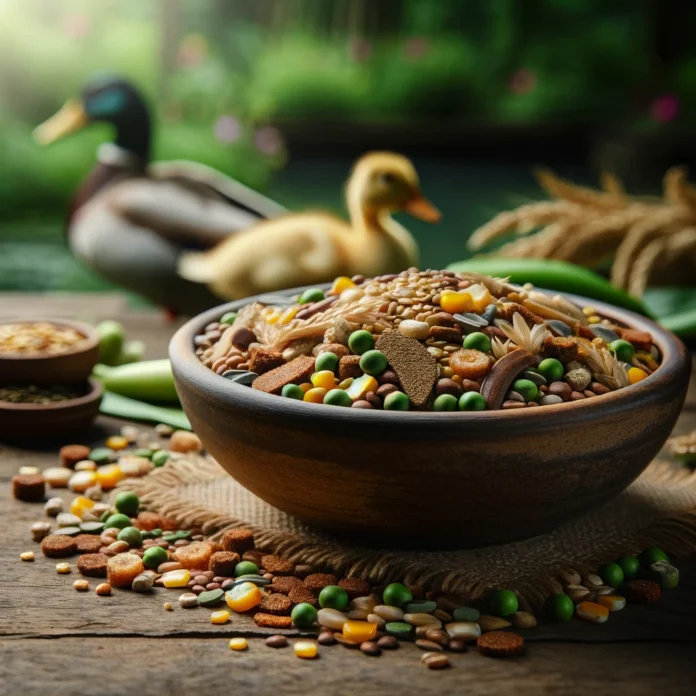Hey there, duck enthusiasts! Are you tired of the same old bread routine for your quacky backyard pals? Well, you’re in for a treat! Today, we’re diving into homemade duck food – a delicious, nutritious, and duck-approved way to keep your feathered friends happy and healthy. Say goodbye to bland breadcrumbs and hello to a gourmet menu that would make even the pickiest duck sing (or quack) with joy!
Understanding Duck Dietary Needs: More than Just Bread Crumbs
Before we start cooking up a storm, let’s get our facts straight. Ducks need a balanced diet, just like us. Bread, although a popular choice, is the junk food of the duck world – low in nutrients and potentially harmful. So, what’s on a duck’s dream menu? We’re talking about grains, greens, proteins, and vitamins – a feast for a quack king!
Critical Ingredients for a Balanced Duck Diet
- Grains: Ducks love grains! We’re talking oats, wheat, barley, and rice. These should form the base of your homemade duck feast.
- Proteins: Just like us, ducks need their protein fix. Chopped hard-boiled eggs, mealworms, and even small fish can be great options.
- Greens: Ducks are natural foragers. Leafy greens, weeds, and duckweed can add that much-needed vitamin punch.
- Vitamins and Minerals: A sprinkle of bird-specific vitamins or calcium supplements can keep your ducks in tip-top shape.
Crafting the Perfect Homemade Duck Feed: Recipes and Tips
The fun part is getting those webbed feet wet in the kitchen! Making homemade duck food is easier than you think and can be fun for the whole family.
Simple and Nutritious Recipes
Grainy Goodness Bowl: A mix of cooked rice, barley, and oats, cooled down and served with a dash of bird vitamins.
Protein Power Punch: Hard-boiled eggs, chopped finely, mixed with mealworms. A true protein feast!
Green Delight Salad: A mix of chopped lettuce, spinach, and duckweed, served fresh.
Tips for Preparing Duck Feed
- Always ensure the ingredients are cooked and cooled down.
- Chop ingredients into small, manageable sizes.
- Avoid seasoning – ducks don’t need the extra salt or spices.
Feeding Ducks Responsibly: Dos and Don’ts
While feeding ducks can be fun, it’s essential to do it responsibly.
Dos:
- Feed ducks in designated areas.
- Offer small quantities to avoid overfeeding.
- Stick to the homemade recipes for a balanced diet.
Don’ts:
- Avoid bread and junk food – it’s not healthy for them.
- Don’t overfeed or leave leftovers – it can attract pests and pollute the environment.
- Never feed ducks anything moldy or rotten.
The Impact of Diet on Duck Health and Environment
What we feed our ducks doesn’t just affect their health; it also impacts their habitat and local ecosystems. A proper diet ensures that ducks remain healthy and their habitats stay clean and balanced. Overfeeding, especially with the wrong foods, can lead to water pollution, attract pests, and even cause health issues in ducks.
Best Homemade Duck Food: Crafting a Feather-Friendly Feast
Creating the best homemade duck food is not just about mixing ingredients; it’s an art. A balanced diet is crucial for your ducks’ health and happiness. Here, we’ll explore how to combine grains, greens, proteins, and vitamins to make a nutritious and delicious meal for your ducks. Discover the top homemade recipes that will make your ducks’ hearts (and stomachs) flutter with joy, from protein-rich egg mixes to vitamin-packed green salads.
What Do Ducks Naturally Eat: Understanding Duck Diets
Ducks in the wild aren’t munching on processed food; they thrive on a natural diet. What do ducks naturally eat, you ask? It’s a diverse mix of plant material, insects, and small fish. This section will delve into the foraging habits of ducks, the importance of a varied diet, and how you can mimic these natural feeding patterns at home to ensure your ducks get all the nutrients they need in their homemade diet.
Duck Food Near Me: Local Ingredients for Your Duck Diet
While ‘Duck Food Near Me’ might seem like a quick Google search, it’s more about understanding the local resources you can utilize. We’ll guide you through identifying locally available ingredients that are safe and nutritious for ducks. From sourcing grains from local farmers to foraging for greens, learn to find the best local ingredients to create a sustainable and eco-friendly diet for your ducks.
What to Feed Ducks: A Comprehensive Guide
‘What to feed ducks’ is a question that goes beyond tossing breadcrumbs at the local park. This segment provides a detailed guide on the dos and don’ts of duck feeding. We’ll cover a range of suitable foods, from homemade mixes to occasional treats, and discuss why certain common foods harm ducks. This guide will ensure you’re well-informed about providing your feathered friends with a healthy and varied diet.
Duck Food Pellets: A Convenient Option
Duck food pellets can be a convenient feeding option, but are they good for your ducks? Here, we’ll explore what duck food pellets are made of, their nutritional value, and how they can fit into a balanced duck diet. We’ll also compare homemade diets with pellet diets and discuss scenarios where pellets might be suitable, ensuring you make an informed decision for your ducks’ wellbeing.
What Do Ducks Eat in the Water: Aquatic Dining Habits
Ducks often dabble and dive in the water, but what exactly are they eating? This section dives into the aquatic aspect of a duck’s diet. From small fish to aquatic plants and insects, understanding what ducks eat in the water helps create a more natural and appealing diet. We’ll also discuss ways to replicate these water-based foods in your homemade duck meals.
Conclusion: Making a Difference One Duck at a Time
Feeding ducks can be more than just a fun pastime; it can be a way to connect with nature and make a positive impact. By choosing homemade duck food over bread and other unhealthy options, you’re providing a nutritious meal for your feathered friends and contributing to a healthier environment. So, grab your apron, unleash your inner chef, and make a difference, one duck at a time!

